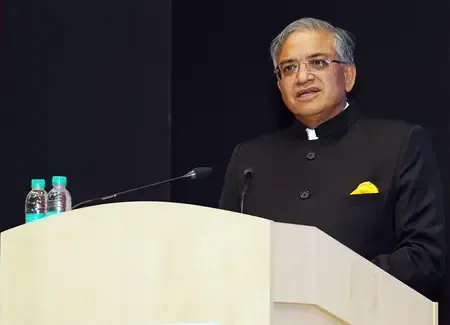Has ECI urged Bengal government for CEO's office autonomy?

Synopsis
Key Takeaways
- ECI's directive emphasizes the need for CEO's autonomy.
- Creation of a separate Election Department is recommended.
- Financial powers for the CEO should match senior department officials.
- Upcoming assembly elections necessitate swift action from the state government.
- Strengthening electoral processes is vital for democratic integrity.
Kolkata, July 22 (NationPress) In a pivotal action, the Election Commission of India (ECI) has communicated with the West Bengal government, instructing it to guarantee the immediate functional independence and administrative enhancement of the office of the Chief Electoral Officer (CEO), West Bengal, Manoj Kumar Agarwal.
The correspondence, dispatched on Tuesday by ECI Under Secretary Ashutosh M. to West Bengal Chief Secretary Manoj Pant, emphasizes concerns regarding the insufficient autonomy currently afforded to the CEO’s office.
The letter highlights that while Agarwal has been appointed as CEO, he also holds the position of ex-officio Additional Chief Secretary to the state's Home and Hill Affairs (Election) Department—a dual role the Commission considers problematic.
“The Commission has observed the deficiency of financial and administrative autonomy available to the CEO, West Bengal, under the present setup,” the letter asserts.
“The CEO’s office operates with limited financial authority and depends on a minor permanent advance from the Finance Department. Moreover, the office is classified as a subordinate branch of the Home & Hill Affairs Department, led by a Principal Secretary-level official, while the CEO himself holds the rank of Additional Chief Secretary.”
In response, the ECI has issued a series of directives to the state government, including the establishment of a separate Election Department. The Commission has requested the creation of an independent election department, entirely separate from any other state government department, equipped with a dedicated budget head to ensure full financial and administrative autonomy for the CEO, deemed essential for the fair and effective conduct of elections.
The ECI has proposed that the CEO, West Bengal, be granted financial powers equivalent to those of Additional Secretary, Principal Secretary, or Secretary-level officers of other departments. Additionally, it suggested appointing a separate Financial Advisor in the Election Department to assist the CEO in fulfilling official duties.
The ECI has directed the state government to expedite the filling of four vacant positions—including those of Additional CEO, Joint CEO, and Deputy CEOs—in consultation with the Commission, particularly with the upcoming West Bengal Assembly elections scheduled for next year in mind.
The ECI’s communication highlights the necessity to bolster institutional autonomy for ensuring the fair conduct of elections in the state.






